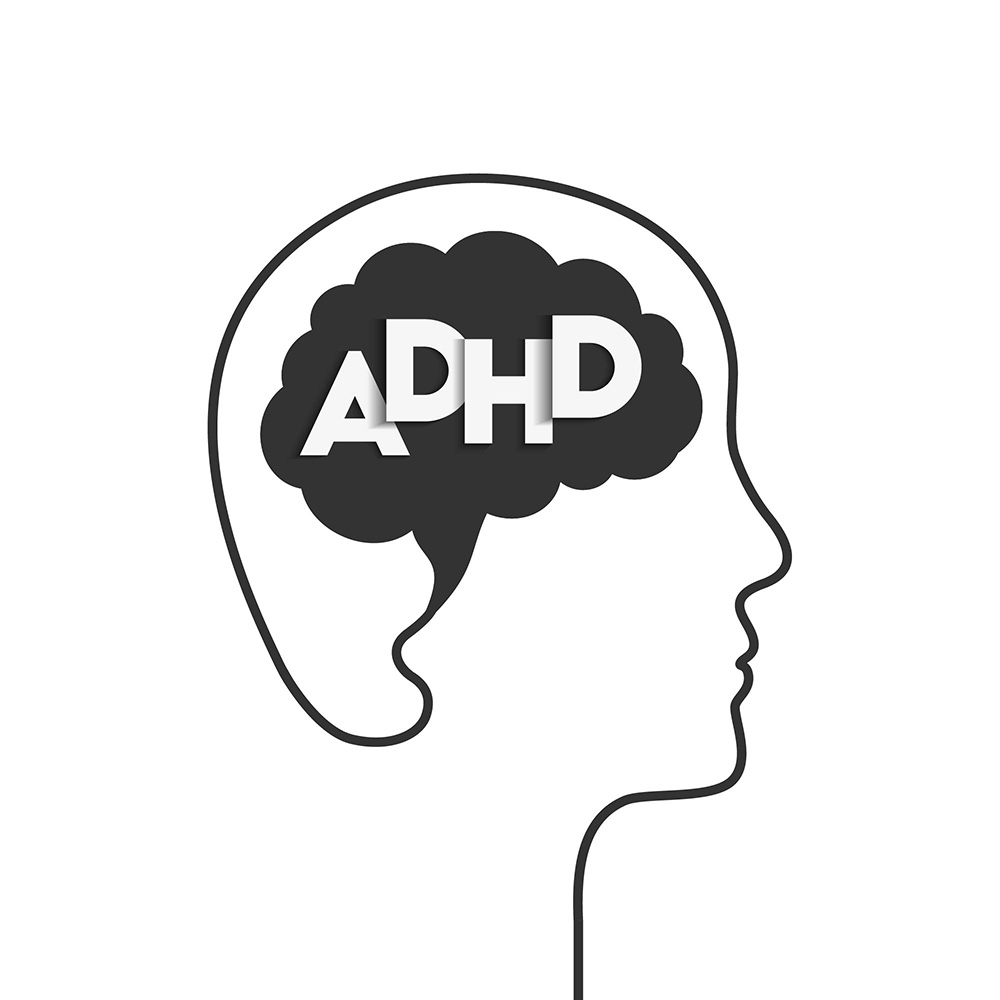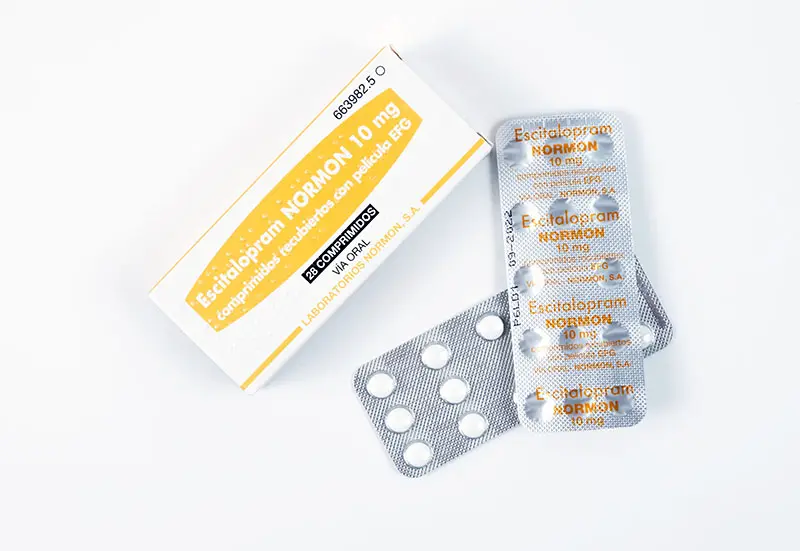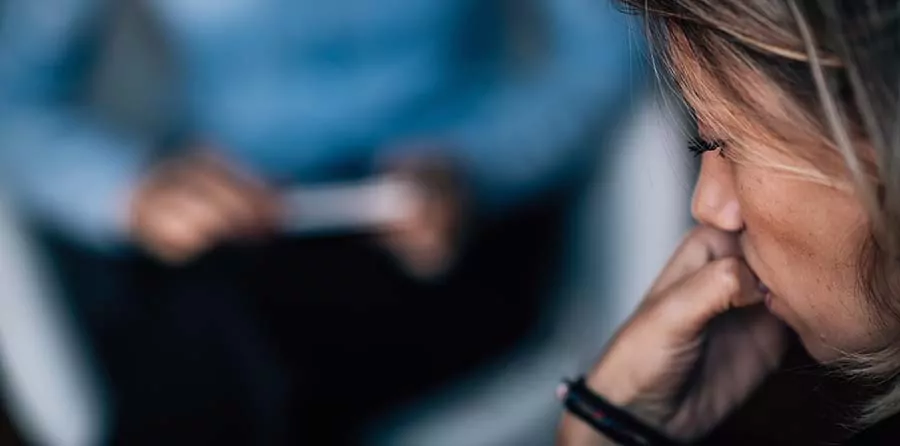Living with anxiety can be extremely uncomfortable, isolating, and for some, debilitating. The cycle of anxiety may seem impossible to break, but there are many forms of treatment and practices available that can help you gain control over your symptoms. With motivation, hard work and support, anxiety can be managed.
Anxiety is an emotion that is a natural response to a stressful situation. It warns us to worry, think through and prepare for something bad that could happen. However, when we think of the term “anxiety” today, it most often is referring to anxiety that is overactive and negatively affecting day to day life.
Feeling disproportionately anxious in a given situation is a highly prevalent experience. In fact, according to the National Alliance on Mental Illness, about 40 million adults (19.1% of adults, or around 1 in 5) are diagnosed with an anxiety disorder. Given the prevalence of undiagnosed anxiety among adults, the number of people experiencing it is substantial.
For many, anxiety impairs one or more aspects of their life. Anxiety can present as excessive worry, about specific fears, social situations, or multiple stressors. Many experience physical symptoms of anxiety, like an increased heart rate, sweating, trouble breathing, nausea restlessness, and muscle tension. For some it can feel so extreme that you feel you are having a heart attack or dying. For others, the psychological fear is paralyzing and can prevent them from doing things, like paying attention, driving, socializing, or even leaving the house. Luckily, with the right approach and effort, it’s possible to have a fulfilling life and gain control over anxiety.
It may be common to hear that medication is a way to improve anxiety. For many, it isn’t possible to completely curb anxiety without the help of medication. Nevertheless, medication isn’t the sole approach to anxiety management. Collaborate with a healthcare provider to create a tailored treatment plan that aligns with your specific needs.
If you are considering medication to reduce symptoms, first-line treatment includes SSRIs, or selective serotonin reuptake inhibitors, such as Zoloft®, Celexa®, Lexapro®, Prozac®, and Paxil®. Additionally, SNRIs, or serotonin and norepinephrine reuptake inhibitors, are considered first-line treatment and include Cymbalta®, Effexor® and Pristiq®. Other serotonergic medications, such as Buspar® and Vistaril®, can relieve symptoms of generalized anxiety. Anxiety disorders have been linked with low levels of serotonin in the brain; these agents work by increasing serotonin, which lessens the feeling of anxiety. Although these medications can be helpful, there are, of course, a few side effects that come with them. Some common ones are nausea, dizziness, drowsiness, headaches, and dry mouth. However, most resolve over time.
Additional medications for anxiety can include blood pressure medications, like propranolol, and benzodiazepines, like Xanax®, Klonopin®, and Valium®. However, benzodiazepines have high risk for physical dependence, abuse and withdrawal, and become less effective with long-term use. Thus, if prescribed, they should only be used as needed for 2-4 weeks at most.
For those who want to avoid taking medication, there are many options that are evidence-based to relieve anxiety and improve overall mental, and even physical, health. While most take motivation and effort, building the self-efficacy to manage anxiety symptoms on your own can make a huge difference in improving your quality of life.
One of the best ways to see results is by going to therapy. Anxiety can be treated through a variety of therapeutic modalities, but one of the most common and successful ones is cognitive behavioral therapy, or CBT. In CBT, you learn techniques to curb your anxiety.
CBT can be a useful way to gain understanding and control over anxious thoughts. When a person engages in CBT, they learn about how anxiety can come up, how to track it for themselves, how to evaluate, challenge, and reframe anxious thoughts that are out of proportion, and how to move past them. One aspect of CBT is exposure therapy, which prepares people to gradually push beyond fear and complete behaviors that they have been unable to attempt due to their anxiety. Another is learning relaxation techniques to manage physical symptoms in the moment.
Therapy can also be completed in group settings, which can provide an additional level of support. This can help others feel comfortable enough to share about their own experiences and realize they’re not alone. It can also help with individuals who are struggling with social anxiety as an exposure technique.
While it’s not always the easiest option, pushing yourself to exercise can vastly reduce anxiety symptoms. Many feel anxious by the idea of trying to exercise, but with effort it can become easier and easier to attempt. Any amount of physical activity can make a difference. When you exercise, you release endorphins (chemicals that improve mood) in your brain. Additionally, it helps you feel more confident in your ability to push yourself and achieve your goals.
Ideally, exercising for 30 minutes 5 days a week can significantly reduce and prevent symptoms of anxiety. Staying consistent is most important. While high intensity exercise can be more effective and work quicker, any form of exercise is beneficial. The best way to stay motivated is to find a type of physical activity you enjoy, set realistic goals for when and how long you can fit it into your schedule, and stick with it even if you have a setback.
Drinking caffeine, alcohol, and using substances can worsen anxiety and often should be reduced or avoided when trying to manage symptoms. Many find comfort in drinking caffeine but large quantities can increase your risk of having a panic attack. Using tobacco and nicotine products, cannabis, and drinking alcohol can feel anxiety reducing in the moment, however consuming them too much or too often can do the opposite. It often helps to take a break from these substances when trying to improve anxiety, but it can be dangerous to go cold turkey off some.
Anxiety and sleep often are interrelated. Many with anxiety struggle with sleep, and many people who struggle with poor sleep also have anxiety. With optimized sleep, symptoms of anxiety can improve. Depending on your age, you may require more or less sleep and may have different barriers to improving sleep quality. It is important to prioritize sleep and there are things you can do to set yourself up for the best success.
The best way to improve sleep is to use CBT-i, or cognitive behavioral therapy for insomnia, which you can complete with a trained therapist or even via app. Additionally, improving sleep habits or sleep hygiene, can improve your sleep. Examples of these lifestyle changes include consistent bedtimes with bedtime routines, avoiding stimulating activities like watching tv, looking at your phone, or exercising right before bed, and avoiding daytime naps.
Mindfulness is a form of awareness of yourself, your thoughts and your surroundings that can help you gain control over your worry and stay in the present. Meditation is an evidence-based way to practice mindfulness and reduce symptoms of anxiety. Meditation can come in many forms, including practicing breathwork and grounding exercises, and it may take time to find the right one that helps you relax. Guided meditations are available online and via apps which make meditation and mindfulness easy to access and try out. Studies show meditation is predicted to reduce the severity of anxiety symptoms by 20%, which is pretty substantial.
Eating well is an important part of feeling good, and a balanced diet can help your body reduce risk for excessive anxiety. For example, when you consume healthy carbohydrates (like oatmeal and quinoa), your serotonin levels increase, which decreases anxiety. Complex carbohydrates additionally help stabilize your blood sugar, along with eating protein for breakfast and eating at consistent meal times, which helps you feel more calm. Omega-3 fatty acids, like fish, nuts, and seeds, have evidence of improving anxiety as well as depression. Additionally, recent evidence has shown a connection between gut health and mental health, with probiotic foods like pickles, kimchi and yogurt having benefits of improving anxiety.
In addition to diet changes, or for some who struggle with making dietary changes, adding certain herbal remedies and supplements can be beneficial for reducing symptoms of anxiety. Herbs like valerian, chamomile and ashwagandha have helped people feel more relaxed and some can be consumed in tea form. Supplements like vitamin D, B vitamins, and magnesium have anxiolytic effects as well. Herbs and supplements are not monitored by the FDA though so it’s important to be aware of all risks and inform medical providers when taking them.
Aromatherapy is another approach for utilizing herbs to reduce anxiety without needing to consume them orally. It is the practice of breathing in essential oils that can reach receptors in the brain that can help you relax. Scents like lavender and lemon balm have often been used to alleviate anxiety.
It might take a while to figure out what strategies help you feel less anxious, but don’t give up. It is common to implement a variety of these techniques, along with therapy and/or medication, to overcome excessive symptoms of anxiety. Everyone can benefit from seeking assistance, so if you’re interested in professional guidance or treatment, reach out to a mental health professional. For more information and support, contact Eleanor Health.
 Adult ADHD and Co-Occurring Issues
Adult ADHD and Co-Occurring Issues
 Understanding and Managing the Side Effects of Lexapro
Understanding and Managing the Side Effects of Lexapro
 Therapy for Anxiety, Depression, Trauma: 3 Common Types
Therapy for Anxiety, Depression, Trauma: 3 Common Types